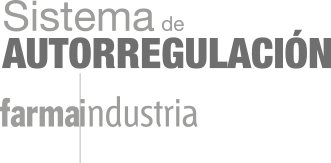Sistema de Autorregulación
Self-Regulation System
Inicio bloque preguntas
Inicio bloque lista
La autorregulación pretende potenciar la confianza en la actividad de la industria y, desde el punto de vista de los compromisos asumidos por las empresas, puede ir incluso por delante de lo establecido por ley o, al menos, identificar y anticipar posibles líneas de regulación.
La autorregulación promueve la mejora continua de normas de comportamiento de forma mucho más ágil, detectadas conforme se avanza en el diálogo con grupos de interés, frente a los ritmos lógicos que conlleva la incorporación de adaptaciones o mejoras vía legislativa.
Fin bloque lista
Inicio bloque lista
Los asociados a Farmaindustria, así como los miembros de EFPIA y aquellas compañías farmacéuticas que, no siendo asociados, se han adherido voluntariamente al Código de Buenas Prácticas, se comprometen y están obligados a respetar los principios recogidos en este, en sus actividades promocionales y en sus interrelaciones con organizaciones de pacientes, organizaciones sanitarias, profesionales sanitarios y con cualquier otra persona que, en el ejercicio de su profesión, pueda realizar o condicionar las actividades de prescribir, comprar, distribuir, dispensar o administrar un medicamento.
Fin bloque lista
Inicio bloque lista
La autorregulación pretende reforzar la confianza y la credibilidad en la industria farmacéutica.
La autorregulación responde por lo tanto a una reflexión interna de la industria (compromiso con comportamientos éticos y responsables para garantizar la sostenibilidad de las compañías y ganar la confianza de la sociedad) y muestra la capacidad de la industria para atender las demandas externas de una sociedad moderna en constante evolución en materia de transparencia (publicación de relaciones y actividades desarrolladas con otros agentes del sector).
Fin bloque lista
Inicio bloque lista
El Código de Buenas Prácticas de la Industria Farmacéutica es la base del sistema de autorregulación de la industria farmacéutica en España y establece normas de actuación y mecanismos de control que regulan y garantizan que la promoción de medicamentos de prescripción y la interrelación con organizaciones sanitarias, profesionales sanitarios y organizaciones de pacientes se lleve a cabo de forma profesional y responsable.
Farmaindustria adoptó el Código Español de Buenas Prácticas de la Industria Farmacéutica con el propósito de garantizar que la información que se pone a disposición de los profesionales de la sanidad, en el marco de la promoción de los medicamentos, sea completa, inmediata y veraz; así como para asegurar que las relaciones que la industria y los profesionales sanitarios establecen se desarrolla respetando los más altos estándares éticos.
Fin bloque lista
Inicio bloque lista
El Código regula: la promoción de medicamentos de prescripción; la interrelación con organizaciones sanitarias y profesionales sanitarios y la interrelación con organizaciones de pacientes.
Fin bloque lista
Inicio bloque lista
Su actuación cubre todos los métodos de promoción, incluyendo prensa y publicidad directa por correo o medios digitales; las actividades de los visitadores médicos; el patrocinio de reuniones de carácter profesional o científico a las que asistan profesionales sanitarios; la utilización de internet y materiales audiovisuales, así como el ofrecimiento de muestras, materiales formativos o informativos y artículos de utilidad médica.
Su ámbito incluye también todas las formas de interrelación entre las compañías farmacéuticas y los profesionales sanitarios, tanto las derivadas de acuerdos de investigación (ensayos clínicos y estudios) como de otro tipo de acuerdos (colaboración, consultoría, etc.), así como las donaciones y subvenciones a organizaciones sanitarias.
A partir de 2016, las compañías farmacéuticas publican, además de las colaboraciones con organizaciones de pacientes, las transferencias de valor realizadas a organizaciones sanitarias y a profesionales sanitarios.
Fin bloque lista
Inicio bloque lista
Establecidas las normas, la industria también ha trabajado en la creación de mecanismos de control, independientes y autónomos de su gestión interna:
- El control del cumplimiento de las normas establecidas en el Código corresponde a la Unidad de Supervisión Deontológica, a la Comisión Deontológica y al Jurado de la Asociación para la Autorregulación de la Comunicación Comercial.
- La Unidad de Supervisión Deontológica de la industria farmacéutica, independiente y con carácter autónomo, tiene diferentes funciones, entre ellas, velar por la aplicación del código, asesorar y formar.
Fin bloque lista
Inicio bloque lista
A la primera pregunta, sí, cumpliendo con el Código. La USD actúa de manera preventiva, velando por lo que establece el Código sobre acciones, términos y condiciones en las que deben de desarrollarse estas relaciones.
El uso final de las transferencias es supervisado por las propias compañías, en base a sus procesos internos.
Fin bloque lista
Inicio bloque lista
La USD y las compañías farmacéuticas sujetas al Código. Adicionalmente nuestro sistema en un Sistema de Autorregulación abierto, esto quiere decir que cualquier tercero no sujeto al Código puede interponer voluntariamente una denuncia a través del sistema de autorregulación.
Fin bloque lista
Inicio bloque lista
Los Acuerdos de Mediación alcanzados ante la Comisión Deontológica se publican en abierto en este enlace. Asimismo, las Resoluciones emitidas por el Jurado de Autocontrol se publican en abierto en este enlace.
Fin bloque lista
Fin bloque preguntas
